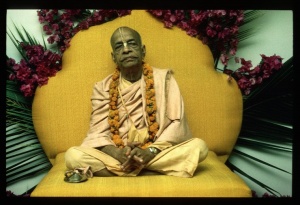SB 1.7.16: Difference between revisions
m (1 revision(s)) |
No edit summary |
||
| Line 1: | Line 1: | ||
{{info | {{info | ||
|speaker= | |speaker=Arjuna | ||
|listener= | |listener=Draupadī | ||
}} | }} | ||
[[Category:Srimad-Bhagavatam - Canto 01 Chapter 07]] | |||
[[Category:Bhagavatam Verses Spoken by Arjuna - Vanisource|010716]] | |||
<div style="float:left">'''[[Srimad-Bhagavatam]] - [[SB 1|First Canto]] - [[SB 1.7: The Son of Drona Punished|Chapter 7: The Son of Droṇa Punished]]'''</div> | |||
<div style="float:right">[[File:Go-previous.png|link=SB 1.7.15]] '''[[SB 1.7.15]] - [[SB 1.7.17]]''' [[File:Go-next.png|link=SB 1.7.17]]</div> | |||
{{CompareVersions|SB|1.7.16|SB 1964|SB 1972-77}} | |||
{{RandomImage}} | |||
==== TEXT 16 ==== | ==== TEXT 16 ==== | ||
<div | <div class="verse"> | ||
tadā śucas te pramṛjāmi bhadre | :tadā śucas te pramṛjāmi bhadre | ||
yad brahma-bandhoḥ śira ātatāyinaḥ | :yad brahma-bandhoḥ śira ātatāyinaḥ | ||
gāṇḍīva-muktair viśikhair upāhare | :gāṇḍīva-muktair viśikhair upāhare | ||
tvākramya yat snāsyasi dagdha-putrā | :tvākramya yat snāsyasi dagdha-putrā | ||
</div> | </div> | ||
| Line 17: | Line 23: | ||
==== SYNONYMS ==== | ==== SYNONYMS ==== | ||
<div | <div class="synonyms"> | ||
''tadā''—at that time only; ''śucaḥ''—tears in grief; ''te''—your; ''pramṛjāmi''—shall wipe away; ''bhadre''—O gentle lady; ''yat''—when; ''brahma-bandhoḥ''—of a degraded ''brāhmaṇa''; ''śiraḥ''—head; ''ātatāyinaḥ''—of the aggressor; ''gāṇḍīva-muktaiḥ''—shot by the bow named Gāṇḍīva; ''viśikhaiḥ''—by the arrows; ''upāhare''—shall present to you; ''tvā''—yourself; ''ākramya''—riding on it; ''yat''—which; ''snāsyasi''—take your bath; ''dagdha-putrā''—after burning the sons. | |||
</div> | </div> | ||
| Line 24: | Line 30: | ||
==== TRANSLATION ==== | ==== TRANSLATION ==== | ||
<div | <div class="translation"> | ||
O gentle lady, when I present you with the head of that brāhmaṇa, after beheading him with arrows from my Gāṇḍīva bow, I shall then wipe the tears from your eyes and pacify you. Then, after burning your sons' bodies, you can take your bath standing on his head. | O gentle lady, when I present you with the head of that brāhmaṇa, after beheading him with arrows from my Gāṇḍīva bow, I shall then wipe the tears from your eyes and pacify you. Then, after burning your sons' bodies, you can take your bath standing on his head. | ||
</div> | </div> | ||
| Line 31: | Line 37: | ||
==== PURPORT ==== | ==== PURPORT ==== | ||
<div | <div class="purport"> | ||
An enemy who sets fire to the house, administers poison, attacks all of a sudden with deadly weapons, plunders wealth or usurps agricultural fields, or entices one's wife is called an aggressor. Such an aggressor, though he be a brāhmaṇa or a so-called son of a brāhmaṇa, has to be punished in all circumstances. When Arjuna promised to behead the aggressor named Aśvatthāmā, he knew well that Aśvatthāmā was the son of a brāhmaṇa, but because the so-called brāhmaṇa acted like a butcher, he was taken as such, and there was no question of sin in killing such a brāhmaṇa's son who proved to be a villain. | An enemy who sets fire to the house, administers poison, attacks all of a sudden with deadly weapons, plunders wealth or usurps agricultural fields, or entices one's wife is called an aggressor. Such an aggressor, though he be a ''brāhmaṇa'' or a so-called son of a ''brāhmaṇa'', has to be punished in all circumstances. When Arjuna promised to behead the aggressor named Aśvatthāmā, he knew well that Aśvatthāmā was the son of a ''brāhmaṇa'', but because the so-called ''brāhmaṇa'' acted like a butcher, he was taken as such, and there was no question of sin in killing such a ''brāhmaṇa's'' son who proved to be a villain. | ||
</div> | </div> | ||
__NOTOC__ | |||
<div style="float:right; clear:both;">[[File:Go-previous.png|link=SB 1.7.15]] '''[[SB 1.7.15]] - [[SB 1.7.17]]''' [[File:Go-next.png|link=SB 1.7.17]]</div> | |||
__NOTOC__ | |||
__NOEDITSECTION__ | |||
Revision as of 11:09, 30 April 2021

A.C. Bhaktivedanta Swami Prabhupada
TEXT 16
- tadā śucas te pramṛjāmi bhadre
- yad brahma-bandhoḥ śira ātatāyinaḥ
- gāṇḍīva-muktair viśikhair upāhare
- tvākramya yat snāsyasi dagdha-putrā
SYNONYMS
tadā—at that time only; śucaḥ—tears in grief; te—your; pramṛjāmi—shall wipe away; bhadre—O gentle lady; yat—when; brahma-bandhoḥ—of a degraded brāhmaṇa; śiraḥ—head; ātatāyinaḥ—of the aggressor; gāṇḍīva-muktaiḥ—shot by the bow named Gāṇḍīva; viśikhaiḥ—by the arrows; upāhare—shall present to you; tvā—yourself; ākramya—riding on it; yat—which; snāsyasi—take your bath; dagdha-putrā—after burning the sons.
TRANSLATION
O gentle lady, when I present you with the head of that brāhmaṇa, after beheading him with arrows from my Gāṇḍīva bow, I shall then wipe the tears from your eyes and pacify you. Then, after burning your sons' bodies, you can take your bath standing on his head.
PURPORT
An enemy who sets fire to the house, administers poison, attacks all of a sudden with deadly weapons, plunders wealth or usurps agricultural fields, or entices one's wife is called an aggressor. Such an aggressor, though he be a brāhmaṇa or a so-called son of a brāhmaṇa, has to be punished in all circumstances. When Arjuna promised to behead the aggressor named Aśvatthāmā, he knew well that Aśvatthāmā was the son of a brāhmaṇa, but because the so-called brāhmaṇa acted like a butcher, he was taken as such, and there was no question of sin in killing such a brāhmaṇa's son who proved to be a villain.